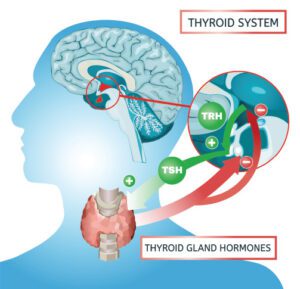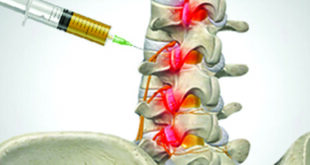 Thyroid hormone, also called thyroxine, plays a pivotal role in how your body generates energy and functions. Imagine the thyroid hormone as lighter fluid thrown onto a fire-it energizes your body’s “fuel burners” known as mitochondria. This hormone, secreted by the thyroid gland located at the base of your neck, is essential for ensuring that your tissues and organs have the energy they need to perform their tasks.
Thyroid hormone, also called thyroxine, plays a pivotal role in how your body generates energy and functions. Imagine the thyroid hormone as lighter fluid thrown onto a fire-it energizes your body’s “fuel burners” known as mitochondria. This hormone, secreted by the thyroid gland located at the base of your neck, is essential for ensuring that your tissues and organs have the energy they need to perform their tasks.
Without sufficient thyroid hormone, the mitochondria in your cells can’t produce enough energy, and the body begins to feel like a barbecue grill running out of lighter fluid. You start to experience various symptoms because the energy production in different organs and tissues decreases. Think of it like a slow burn rather than a full blaze-your body’s overall energy and function diminish.
How Thyroid Hormone Affects the Body
Because thyroid hormone influences energy production, when levels are low, every part of your body suffers in some way. Weight gain and difficulty losing weight are common signs of low thyroid function, as less energy production means a slower metabolism. However, the symptoms extend far beyond that and vary from one system to another:
- Hair and Skin: Slow energy production results in slow-growing, thinning, and brittle hair. Skin may become dry and nails fragile.
- Muscles: Low thyroid levels can lead to muscle tension and pain because the muscles can’t relax properly.
- Brain: Energy is essential for mental clarity, so low thyroid levels often lead to brain fog, depression, forgetfulness, and trouble concentrating.
- Digestive System: With insufficient energy, the intestines slow down, causing constipation.
- Temperature Regulation: Energy generates heat, so people with low thyroid function often feel cold and struggle to maintain a normal body temperature.
- Fatigue: The most noticeable symptom is often extreme fatigue, as the body simply can’t produce enough energy.
Here’s a look at the full spectrum of symptoms related to thyroid hormone deficiency:
- Low energy, fatigue, or lethargy
- Weight gain or difficulty losing weight
- Dry skin, brittle hair and nails
- Thinning eyebrows and eyelashes
- Slow heart rate
- Cold hands and feet
- Menstrual irregularities and fertility issues
- Constipation
- Muscle and joint pain
- High cholesterol and insulin resistance
- Mental fog, depression, and low motivation
Diagnosing a Thyroid Problem
Despite the widespread impact of thyroid hormone, diagnosing a thyroid problem isn’t always straightforward. Many healthcare providers rely on a test for Thyroid Stimulating Hormone (TSH), which is only part of the picture. While an elevated TSH level can indicate a primary thyroid problem, it doesn’t reflect how much active thyroid hormone-especially the most important form, free T3-is available to your cells.
The thyroid mainly produces T4, a precursor hormone that must be converted into free T3 in the liver to become active. If this conversion process fails, known as secondary hypothyroidism or Low T3 Syndrome, the body may have enough T4 but not enough active T3 to fuel your cells.
There’s also a condition called thyroid hormone resistance, or tertiary hypothyroidism, where the thyroid produces enough hormone, but the cells are unable to respond to it effectively. The symptoms of hypothyroidism remain, even though lab tests may show normal levels of thyroid hormone.
The Complexities
of Thyroid Hormone Resistance
To make matters more complicated, thyroid resistance can occur in some tissues and not others. This means some parts of the body get enough thyroid hormone while others do not, leading to inconsistent symptoms across different systems.
Unfortunately, many healthcare providers aren’t trained to look beyond a simple TSH test. Without testing for free T3 or understanding thyroid hormone resistance, patients often go undiagnosed or mistreated. Some may even be diagnosed with hyperthyroidism (overactive thyroid) and incorrectly treated with medications that suppress thyroid function, leading to more serious problems.
Synthetic vs. Natural Thyroid Replacement
For those diagnosed and treated for thyroid hormone deficiencies, another layer of complexity is added by the type of replacement medication used. Most patients are prescribed synthetic T4 (levothyroxine), but as we’ve discussed, the body needs to convert this into active T3, and that doesn’t always happen efficiently.
Many patients report feeling better on desiccated thyroid extract (DTE), a natural medication derived from porcine (pig) thyroid glands. This extract contains a combination of T4 and T3, as well as other thyroid-supporting nutrients like iodine and prohormones. Clinical studies suggest that patients taking DTE often experience better symptom relief, such as more energy, improved mood, weight loss, and feeling warmer, than those taking synthetic T4 alone.
The Benefits of Proper Thyroid Hormone Replacement
When thyroid hormone is adequately replaced, the benefits are immediate and wide-ranging. Patients often experience:
- Improved metabolism and fat loss
- More energy and less fatigue
- Improved mood, concentration, and memory
- Thicker, healthier hair, skin, and nails
- Better menstrual regularity and fertility in women
- Reduced cholesterol and insulin resistance
- Increased body warmth and cold tolerance
- Higher libido and better sleep
Research Supporting
Thyroid Hormone Replacement
Several studies highlight the importance of thyroid hormone, especially in conditions like chronic fatigue syndrome (CFS) and depression. In patients with CFS, research shows that insufficient thyroid hormone levels, particularly low T3, contribute to fatigue and other symptoms. Even in cases where patients do not respond to antidepressants, thyroid hormone replacement has been shown to improve mood and alleviate depressive symptoms.
Summary
Thyroid hormone is vital for energy production in every cell in your body. Without enough of it, the body struggles to function properly, leading to a wide range of symptoms that can significantly decrease your quality of life. Proper diagnosis and treatment, especially with a focus on active T3 levels, are key to restoring your health. Many patients find the best relief from symptoms with a combination of T4 and T3, often through natural desiccated thyroid extract. When thyroid hormone is restored to optimal levels, you’ll feel more energetic, warmer, healthier, and happier.
863-899-2404
info@optimizedwellness.net
optimizedwellness.net
 Central Florida Health and Wellness Magazine Health and Wellness Articles of the Villages
Central Florida Health and Wellness Magazine Health and Wellness Articles of the Villages



